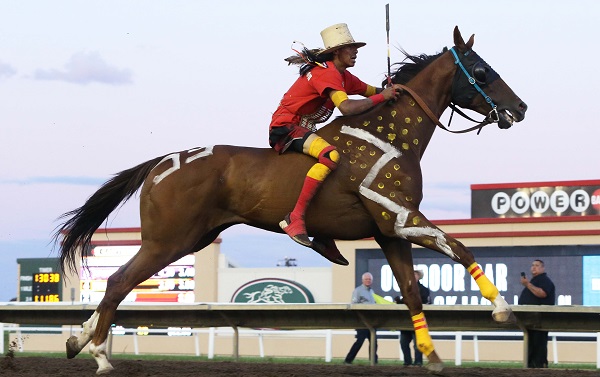BY JIM WELLS
Everybody at the table had seen the movie, Wind River, a murder mystery that takes place on the Wind River Reservation in Wyoming, a production of what is happening with shameful and painful regularity across the nation.
The conversation had started with a discussion of the top hat Jesse James White had worn around Canterbury Park since arriving, but had just abandoned.
“Too many people didn’t like it,” he explained.
The lead rider for the Bad Nation Relay team was assured it was a stylish looking headgear, accompanied by a feather as it was, and that people were probably a bit envious.
Whatever the case, White did not abandon the breechcloth bearing the team logo that includes the acronym, MMIW, which stands for Missing and Murdered Indigenous Women. Other members of the team bear the same message on their racing gear.
White, his father, James, and Michael Coleman, the team captain and set-up man, dedicated themselves to this cause in an attempt to bring awareness wherever they can.
The acronym is there to draw attention to an often overlooked and ongoing tragedy. In the United States, 84 percent of Native American women experience violence of one kind or another during their lifetimes. The murder rate of Indigenous women is 10 times that of the rest of American society. Homelessness, poverty and addiction are contributing factors. The murders and abductions, unlike Canada, are committed primarily by non-Indian men.
States such as Washington, Minnesota and Arizona are beginning to address the issues, but without the necessary urgency. Thus, the Bad Nation team, began dedicating themselves two years ago to spreading the word, following the death of Olivia Lone Bear, a woman in her thirties. “She was discovered in her car in a lake,” White said, his father, James White, nodding in agreement.
Lone Bear,32, was from the MHA (Three Affiliated Tribes) at Fort Berthold, N.D., and was the mother of five.
“Women are sacred in our society. They are the givers of life,” said Coleman. And tribal nations are losing them at an alarming rate. “Our sisters need a voice,” he added.
Coleman, the team captain and set-up man, won an Upper Midwest Golden Gloves heavyweight title in Minneapolis thirty-odd years ago. His team also participates in the annual Big Foot honorary march, a 352 mile trip from home to the Wounded Knee cemetery. Big Foot and his band, men, women and children, were traveling peacefully north in South Dakota when they were massacred by the Seventh Calvary at Wounded Knee in 1890. His great grandfather, 16 at the time, was kidnapped and became part of the Buffalo Bill wild west show that toured the country and even made appearances in Europe.
The Bad Nation team represents the Hunkpati tribe of Crow Creek whose people are related to the Mdewakanton people of Mystic Lake and elsewhere in Minnesota. They were driven out of the state and moved to Crow Creek after the 1862 war here.
FRIDAY RELAY RACES
The Bad Nation team has generally done well in Shakopee, but is having a hard time this year. James White had his son, Jesse, riding by the time he was a year and one-half old. Later, he bought him a pony on the order of a Shetland that Jesse rode until he reached high school age.
Bad Nation finished out of the top two in the first of two relay heats on Friday’s card. Tissidimit, a Shoshone Bannock team from Idaho and two-time winner of the Canterbury Park relay races, won the first heat. Brew Crew, representing the Oglala Sioux from South Dakota, was second.
Young Bear Express won the second heat behind an expressive ride from Tyray Cadotte. The team represents MHA, the Three Affiliated Tribes from Fort Berthold, N.D. Second was Mountain River from Fort Belknap, Montana.
The championship rounds of the relay racing competition will be staged on Saturday night’s card, which includes, for the first time at Canterbury, a women’s race.
